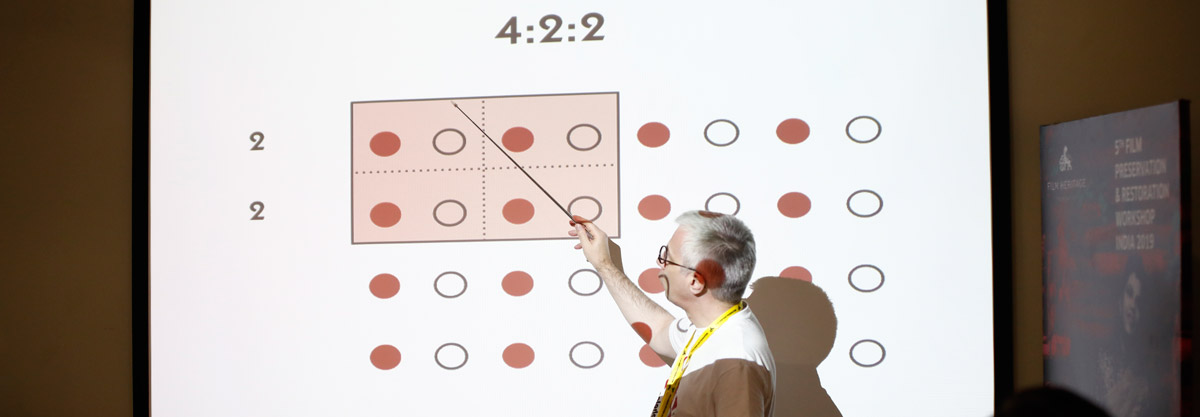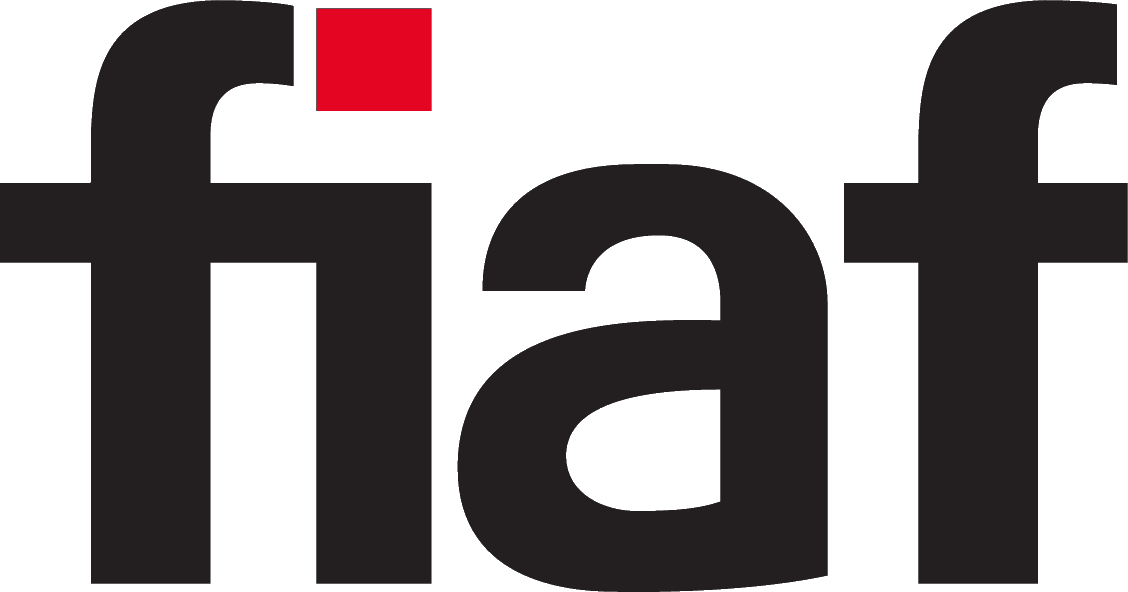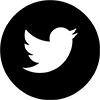 Reto Kromer teaching. Photo courtesy of the Film Heritage Foundation
Reto Kromer teaching. Photo courtesy of the Film Heritage Foundation
FIAF Commissions’ Thursday Online Workshops
In September 2022, the FIAF Commissions launched a new series of online workshops covering a wide range of topics discussed in FIAF. The basic idea is rooted in what libraries have done for some time now and which is called Library Carpentry. Rather than inviting external experts, trained people from libraries teach each other basic concepts which will also revolve around data literacy (introductions to Open Refine, Python, GitHub etc.). We could expand that format and think of other ones to accompany this very technical focus.
We also want to address current debates revolving around sustainability, long term archiving and online presentation. How can we digitize, archive and present digital media by taking questions of rights, formats and the environment into consideration?
The workshops are planned as virtual events for the moment and might later be extended to in-person events.
Possible formats include presentations plus a panel discussion and hands-on teaching. More can be developed as we gain experience. We don’t aim at experts. Usually, no previous experience is required. Advanced levels are marked as such and will provide knowledge for those who want to explore topics into more depths. The number of participants vary depending on the nature of the specific workshop, but is generally be limited to enhance knowledge transfer and discussion. No fee is charged, but participants have to register and places are limited. Information on how and when to register will be posted below.
Forthcoming Thursday Online Workshops:
22 May 2025
“Cataloguing with limited resources”
Duration: 2 hrs
Organized/presented by: Adelheid Heftberger (Host, Head of the CDC), Anne Gant (Host, Head of the TC), Murchana Borah (Film Heritage Foundation, CDC member), Camille Blot-Wellens (FIAF, TC member), Caroline Fournier (Cinémathèque suisse, TC member).
Limited to 20 participants.
Target group: Anyone who would like to hear more about cataloguing according to standards even when resources are limited. It will be useful if you have experience in attempts to solve this issue, but will be beneficial to everyone who would like help starting the process.
Content: Cataloguing is carried out in Excel spreadsheets (or other tools) in many archives (especially in the Global South, but not limited to) because of a lack of resources. We invite everyone who is interested or affected to hear how you can still follow the EN 15907. Murchana Borah from the Cataloguing & Documentation Commission will present ways of cataloguing when resources are limited. Her work has also been integrated in the recent activities of the FIAF Technical Commission on the fundamental archiving resources toolkit (FAR), which will be presented in the second part of the workshop by Camille Blot-Wellens and Caroline Fournier, two members of the Technical Commission.
Registrations will open in April 2025.
12 June 2025
“Workshop/Discussion “Green Archiving” - Part 2
Duration: 2 hrs
Organised/presented by: Adelheid Heftberger (Host, Head of the CDC) and Clément Lafite (Host, University of Udine, PhD, SAFE Project)
Limited to 20 participants.
Target group: Digital preservationist, archivists responsible for creating sustainable workflows and basically everyone interested in the topic of how to make our archives “greener” and climate friendly by starting with small steps.
Content: We will look at adjustments which are comparatively easy to apply in archival (digital) preservation workflows. Furthermore we aim to engage in a discussion and exchange of practices within the group.
Registrations will open in June 2025.
Past workshops:
7 March 2024
“CEN 15907 in practice: Using the Variant in the Centre national du cinéma et de l'image animée (CNC)”
Duration: 2 hrs
Organized/presented by: Adelheid Heftberger (Host, Head of the CDC), Katerina Kampoli (Film Cataloger, CNC), and Tristan Gomez (Database Administrator, CNC).
Limited to 20 participants.
Target group: Everyone interested in cataloguing using the CEN 15907 and particularly in understanding how to implement the Variant. This workshop will be most beneficial to experienced catalogers/information specialists but might be interesting also to those with an interest in the topic.
Content: The presenters will explain the way the CNC has implemented and adapted the CEN 15907 in “Garance” the institution’s new cataloguing tool. Then, the focus will shift on cataloguing in a 4-tier level using the optional variant level, illustrated by many examples. After the presentation the participants will address questions, share their thoughts and discuss the examples given beforehand.
Presentation slides of this workshops are available HERE.
23 May 2024
"Introducción a los metadatos para la descripción central de recursos de imágenes en movimiento: aplicaciones según FRBR, RDA, EN15907" (en español)
Duración: 3 horas
Organiza/presenta: Adelheid Heftberger (Anfitriona, Directora del CDC), Circe Itzel Sánchez González (miembro FIAF CDC, UNAM, Ciudad de México)
Limitado a 20 participantes.
Dirigido a: personas interesadas en la catalogación de recursos de imágenes en movimiento que deseen actualizar sus conocimientos sobre su descripción normalizada a nivel internacional.
Contenido: La ponente ofrecerá una introducción a las normas descritas a través de la explicación de sus conceptos básicos. Se presentarán ejemplos ilustrativos considerando distintos tipos de recursos de imágenes en movimiento. Al finalizar la presentación se atenderán las preguntas de los participantes.
13 June 2024
“Detecting and curating harmful language in cultural heritage collections - the DE-BIAS project in theory and practice”
Duration: 2 hrs
Organized/presented by: Adelheid Heftberger (Host, Head of the CDC and Editor of Treasures), Kerstin Herlt, Julia Welter, (DE-BIAS Project Coordination; DFF - Deutsches Filminstitut & Filmmuseum), N.N. (The Netherlands Institute for Sound & Vision).
Limited to 20 participants.
Target group: Everyone who wants to raise archival awareness about language and would like to update descriptions of the archival records.
Content: Partners from the DE-BIAS project will give an input statement and conduct a workshop with practical examples. We will discuss the challenges such as the size of our collections, the complexity of the undertaking, how to involve marginalized communities, and how to overcome lack of knowledge or awareness.
More information about the project can be found here.
Registrations are now closed.
17 October 2024
1pm (CET)
“No database required: Storing and accessing metadata in a common/generic way”
Duration: 2 hrs
Organized/presented by: Adelheid Heftberger (Host, Head of the CDC), Peter Bubestinger (AV-RD)
Limited to 20 participants.
Target group: Everyone interested in exploring innovative ways for storing metadata and thinking out of the box when it comes to databases. Experience with cataloguing is beneficial but not required. Just bring your curiosity and questions! May be particularly interesting for archivists with a limited budget and/or no database system yet.
Content: Imagine being able to:
- seamlessly annotate any data. Anywhere. (key/value + relationships)
- basic and interoperable (as moving and renaming files/folders)
- copy/move/merge any data from anywhere (without having to worry about file/folder naming and structure)
Peter will present existing, standard - yet overlooked means for storing key/value metadata on any file - regardless of its data-format - in a common, generic way. As application independent as reading-and-writing a filename or a folder path. In combination with some technologies "borrowed" from Big Data setups, we may be looking at a common blue-print for a metadata+storage system that allows dissolving the typical collection-type- and institution-barriers in a surprisingly simple and elegant way.
Registrations for this workshop are now closed.
14 November 2024
“Workshop/Discussion “Green Archiving” - Eco-Friendly Practices in Use in the Film Archives”
Duration: 2 hrs
Organized/presented by: Adelheid Heftberger (Host, Head of the CDC), and Reto Kromer (reto.ch GmbH), Clément Lafite (University of Udine, PhD, SAFE Project), Valentina Rossetto (Cineteca Nazionale), Caroline Figueroa Fuentes (Staatliche Museen zu Berlin)
Limited to 20 participants.
Part 1: Presentation by Reto Kromer on how to make your streaming files more eco-friendly.
Part 2: Eco-friendly solutions for cleaning films? Current practices and future challenges (moderated by Clément Lafite, University of Udine / SAFE Project)
- Introduction (5 min)
- Talk 1. “Bio-cleaning alternatives for cellulose-based materials?” Valentina Rossetto (Cineteca Nazionale, Italy) (10 min)
- Talk 2. “Investigations on the effects of essential oils on motion picture films” Caroline Figueroa Fuentes (Staatliche Museen zu Berlin, Germany) (10 min)
- Discussion (35 min)
Target group: Digital preservationist, archivists responsible for creating sustainable workflows and basically everyone interested in the topic of how to make our archives “greener” and climate friendly by starting with small steps.
Content: We will look at adjustments which are comparatively easy to apply in archival preservation workflows. We will also discuss sustainable formats for AV material on a very practical level. Furthermore we aim to engage in a discussion and exchange of practices within the group.
The video recording of this workshop is available here.
16 January 2024
4pm (CET)
Workshop/Discussion: “Restoring the Past, Funding the Future: copyright, restorations and approaches to recouping/protecting archival investments”
Duration: 2 hrs
Organized/presented by: Matěj Strnad (Host, Head of PACC), and Claudy Op den Kamp (Bournemouth University), Annabelle Shaw (British Film Institute)
Limited to 20 participants.
Part 1: Position statement and opening by Matěj Strnad, Head of PACC
Part 2-3: Position statements by Claudy Op den Kamp and Annabelle Shaw
Part 4: Discussion of some of the examples and case studies provided by the participants
Target group: Curators, restorers, access and legal specialists working in or around film archives.
Content: We will look into ways in which archives are trying to protect their scientific, symbolic and financial investments in restoration projects, without necessarily resorting to copyright and other rights-related protections. We will also discuss the possible definitions and understandings of what might constitute “creative” and therefore, in theory, copyrightable acts within various restoration workflows. The prospects of keeping public domain works in the public domain will be addressed.
Registrations for this event are now closed.
27 February 2025
1pm (CET)
“Contributing to the FIAF Treasures from the Film Archives”
Duration: 2 hrs
Organized/presented by: Adelheid Heftberger (Host, Head of the CDC and Editor of Treasures), Julia Welter (Data Editor and Archive Support Agent), and members of the Treasures Task Force of the CDC.
Limited to 10 participants.
Target group: Everyone interested in providing or updating their data on the FIAF Treasures database. No previous experience with the Treasures upload-function necessary.
Content: The FIAF Treasures from the Film Archives, which provides unique information about over 60,000 silent-era holdings from 110 different film archives, is conceived as a tool to aid the work of preservation, research and film exchange between film archives. The CDC strives to give contributing archives more freedom to update information on their holdings. Thus we would like to introduce our new upload-tool and explain how to use it.
Registrations for this workshop are now closed.
27 March 2025
5.30pm (CET)
"Contributing to the FIAF Directory of Special Collections" and "Collecting born-digital film related materials - an initiative by the BFI"
Duration: 2 hrs
Organized/presented by: Adelheid Heftberger (Host, Head of the CDC), Anna Fiaccarini (Cineteca di Bologna, Rapporteur of the Task Force on Special Collections), Grace Johnston (British Film Institute)
Limited to 15 participants.
Target group: Part 1) Everyone interested in providing or updating their data in the Directory of Special Collections. Part 2) Everyone responsible or interested in collecting digital born film related materials. In both cases there is no previous experience necessary.
Content: The FIAF Directory for Special Collections provides information about special collections and film related material in the FIAF-related archives. The CDC strives to give contributing archives more freedom to update information on their holdings. Thus we would like to show institutions how they can update their information and also introduce the directory to interested archives and institutions which have not used it before. In our second part Grace Johnston will talk about a recent initiative by the British Film Institute to establish an international network to connect archives that are currently working with, or have a future interest in working with, born-digital film related content.
Registrations are now closed. Selected candidates will be notified by email and will be given their preparatory homework (if applicable) by 24 March.





